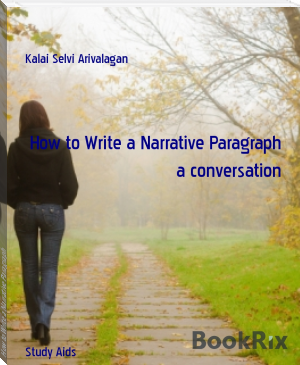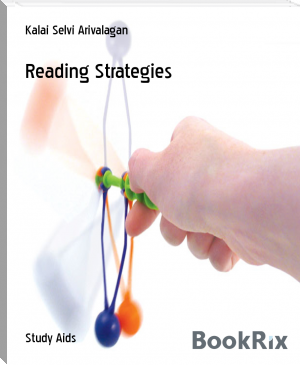How to Write Better Content, Kalai Selvi Arivalagan [best books to read fiction TXT] 📗

- Author: Kalai Selvi Arivalagan
Book online «How to Write Better Content, Kalai Selvi Arivalagan [best books to read fiction TXT] 📗». Author Kalai Selvi Arivalagan
Globalization has opened the doors to the writing world. It has brought numerous opportunities to explore the possibilities of getting recognized all over the world. To break out of the mundane Indian English standards neither British nor American, the common people in India write their Indian English mixed with their vernacular tone. Most of the sentence structure lack elegance and turn awkward constructions. “Are you not a native speaker?” is the embarrassing question asked to Indian writers who fail to adhere to international standards.
How will you write?
Think about those days when you have to wait to get a reply from the editorial board of a reputed magazine or a weekly. A simple rejection letter apologizing for not selecting your poem or story or an article would have left you broken hearted for weeks. Only people who were lucky to have someone who could guide them to write what matched the readership of the day succeeded in their attempts. Three decades before, people did not take writing as their career for it did not pay well and it took years to become a successful writer.
Writing has become an acclaimed career now. The ever growing communication technology has opened a wide online platform where you can submit whatever you write and enjoy the readership from the nook and corner of the world. There are so many web portals that encourage submission of your writings and provide you the much needed support with their feedback. In addition to these professional web portals, there are many free portals that share the online spare for your publishing dreams.
Let me share a simple trick that can help you write better and get more readers. Though schools and colleges help you to read and write, there is no special focus that will help the young to refine their way of writing and evolve into better writers.
Writing process
You must understand thoroughly the different steps in the writing process. Prewriting, Drafting, Revising, Editing and Publishing. You must know the importance of each stage and the amount of time that you can spare for each stage. Prewriting involves brainstorming for ideas; drafting allows you to write whatever you wish to write; revising helps you to check the flow of ideas, transition of ideas and how ideas are well connected; editing helps you to check the format, sentence structure, grammar and punctuation; publishing helps you to share your writing with your readers.
Types of Writing
The four different types of writing are: Narrative, Descriptive, Expository and Persuasive.
Narrative means a writing that tells a story.
Descriptive means a writing that gives information or facts about something or someone.
Expository means a writing that explains something.
Persuasive means a writing that can make someone to do or believe something by giving reasons.
Reading Strategies
Take the initiative to learn about the different reading strategies that authors would include in their content. These reading strategies help not only the authors but also the readers to decide on the category their writing belong and what could be expected from their writings.
The most important ten reading strategies you must know.
1. Author’s purpose
2. Main idea
3. Fact and opinion
4. Inference
5. Drawing conclusions
6. Sequencing
7. Prediction
8. Context clues
9. Summarize
10. Compare and contrast
Sentences with better construction
Confusing clauses, slang, idioms, and errors in grammar or punctuation are the common causes of poor sentence construction. Five poor “sentence habits” commonly appear in writing. Elimination of these habits can improve construction of sentences.
1. Starting with Dependent Clause
It is not wrong to start a sentence with a dependent clause, but the sentences are difficult to understand.
Beginning with a Clause
At the start of the business year and at the beginning of the third quarter, the laboratory has a project review with the director of research.
In this sentence, the reader had to read more words to understand what they were talking about the laboratory.
Start the sentence with a Noun
The laboratory has a project review with the director of research each January and July.
Beginning with a Clause
Traveling to the western tank farm, he met three lab members near building 318.
Beginning with a Pronoun
He met three lab members on his way to the western tank farm. They were near building 318.
2. Subject and Verb Do Not Agree
If the subject is singular, the verb must also be singular.
Long sentences with many clauses show separation of the subject and verb, and this often leads to subject-verb disagreement.
Subject and Verb Do Not Agree
The output of three wear testers, the block-on-ring, the ball-on-plane, and the microtribometer are directed to a single computer.
Metallography of failed balls and races are key aspects of failure analysis.
Agreement
The output of three wear testers, the block-on-ring, the ball-on-plane, and the microtribometer is directed to a single computer.
A group of distinguished metallurgists is to convene for the selection process.
3. Incoherent Sentences
Incoherent sentences usually result from the omission of a word.
Incoherent
The procedure for cutting circuit boards for failure study begins stripping the devices. (missing preposition)
The procedure for cutting circuit boards for failure study begins with stripping the devices.
Differential scanning calorimetry (DSC) and thermogravimetric analysis (TGA) to determine if any significant differences existed between the samples identified as A and D. (missing verb)
Differential scanning calorimetry (DSC) and thermogravimetric analysis (TGA) were employed to determine if any significant differences existed between the samples identified as A and D.
4. Same-Sounding Word and Wrong Usage
Some English words have the same pronunciation but different meanings. These words are frequently misused. It is always good to reread after running the spell checker.
• Two, to, and too
• Coarse and course
• Principal and principle
• Loose and lose
• Plane and plain
• Their and there
• See and sea
• Affect and effect
• Brake and break
5. Sentences Containing Slang or Idioms
Use of an Idiomatic Expression
The rejection rate is higher than normal for the delta station chassis that we have received from France. Please get on top of the situation.
Use of Slang
The transport roller bearings were hammered. There was reddish goop coming out of the seal. We decided that this baby had to go, and we served up a new issue.
Translation
The transport bearing failed. Wear debris was apparent in the seal area, and a decision was made to replace it.
A writing style should use sentences free of clauses that can confuse, slang, idioms, and errors in grammar or punctuation.
Reading any document with paragraphs helps a reader to understand how an author finishes one thought and moves to another. A paragraph break (indent or next line of text) helps the reader to understand that a new thought, idea, or piece of information is presented.
Paragraphs are essential in good writing, but many people take paragraphs for granted. We always read in paragraphs. Any content in a newspaper or a book or a letter is broken into paragraphs.
Good paragraphs are unnoticeable. They just make reading easier by grouping related sentences together. This basic objective depends on the choice of paragraph content and length
The key part of any paragraph is its topic sentence. Paragraphs must have a topic sentence, which is supported by the other sentences in the paragraph.
Most often, the paragraph begins with the topic sentence. It continues with supporting sentences and then ends with some form of thesis restatement and a transition to the next paragraph.
Every paragraph must have a topic sentence.
Paragraphs contain a complete thought.
Paragraph length needs to be just right; just give enough information for a thorough discussion of the topic sentence.
Publication Date: 01-08-2020
All Rights Reserved
Dedication:
Writing





Comments (0)